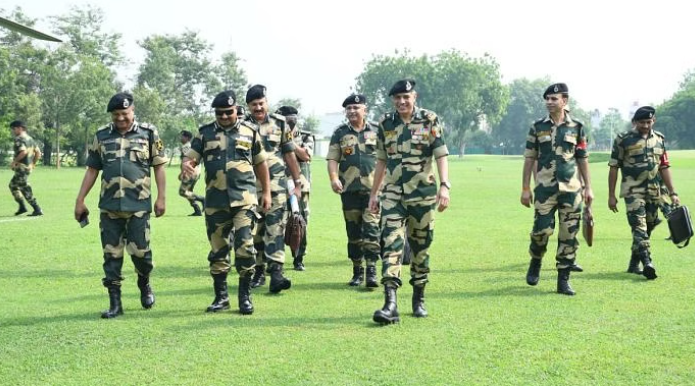Premature Repatriation of BSF Chiefs Amid Rising Militancy in Jammu (GS Paper 3, Defence)

Introduction
- In a significant administrative decision, the Central Government has repatriated Border Security Force (BSF) Director General Nitin Agarwal and BSF Western Command head Y.B. Khurania to their parent cadres.
- Announced on August 2, 2024, this move comes amid a marked increase in militant activities and attacks on security forces in the Jammu region.
- This development highlights the pressing security challenges facing the area and raises questions about the strategic response to the escalating threats.
Repatriation Orders
- The sudden repatriation of BSF chief Nitin Agarwal and Western Command head Y.B. Khurania has been sanctioned by the Cabinet Appointments Committee and the Ministry of Home Affairs (MHA).
- Agarwal, an officer from the 1989 batch of the Kerala cadre, was appointed as the BSF chief in June 2023 for a tenure extending until July 2026.
- However, the recent decision has cut his tenure short, sending him back to the Kerala cadre immediately.
- Similarly, Khurania, who has been serving as the chief of the Western Command since September 2023, will return to his parent cadre in Odisha.
- This decision reflects an urgent response to the worsening security situation in the region.
Security Situation in Jammu
- The Western Command, under Khurania's leadership, is responsible for securing the international border with Pakistan in Jammu.
- This region has seen a troubling increase in militant activities over recent years.
- Since 2021, security forces, including personnel from the Indian Army, Central Reserve Police Force (CRPF), BSF, and Jammu and Kashmir Police, have suffered substantial casualties.
- The year 2024 has been particularly severe, with a noticeable uptick in attacks on security personnel.
- Reports indicate that over 50 security personnel have been killed in the region since 2021, with a significant number of these fatalities occurring in the current year.
Shifting Tactics and Increased Militancy
- Recent assessments by security experts reveal a troubling shift in militant tactics.
- Militants are now utilizing old infiltration routes and opting to stay in Jammu's dense forested areas for extended periods.
- This strategy contrasts with the previous pattern of quickly moving to the Kashmir Valley.
- The prolonged presence of militants in Jammu’s challenging terrain has led to an increase in militant attacks and heightened insecurity in the region.
- This shift in tactics is indicative of a more sustained and strategic approach by militant groups, complicating the security dynamics for the forces deployed in the area.
Statements from Security Officials
- Army Chief General Manoj Pande has expressed significant concern over the current situation in Jammu.
- He has pointed out that Pakistan appears to be intensifying efforts to abet terrorism in Jammu, especially as the overall security environment in the Kashmir Valley improves.
- The increased frequency of attacks and the growing number of casualties among security personnel underscore the urgent need for a reassessment of current strategies and a more robust approach to countering the insurgent threat.
Conclusion
- The premature repatriation of the BSF leadership underscores the critical nature of the security challenges facing Jammu.
- With rising militancy and a concerning increase in casualties among security forces, the move reflects a pressing need for strategic adjustments and enhanced security measures.
- The incoming leadership will face the crucial task of navigating these complex dynamics, implementing effective strategies to curb militant activities, and restoring stability along the volatile India-Pakistan border.
- This transition period will be pivotal in shaping the future security posture of the region and addressing the ongoing threat of militancy.


